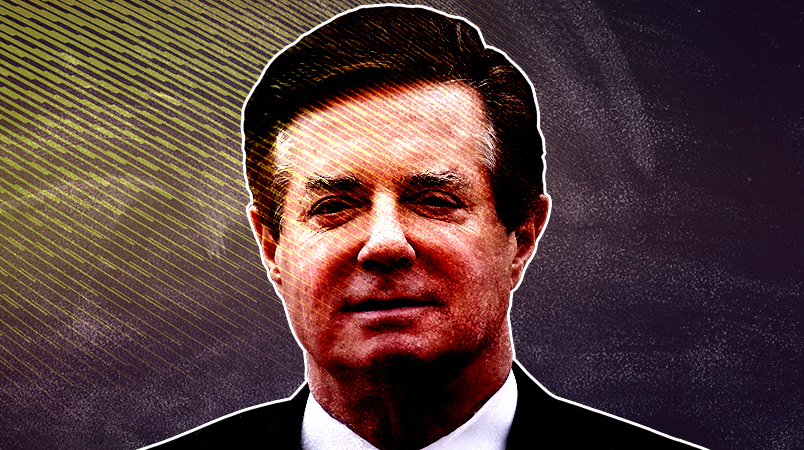Former Trump campaign chairman Paul Manafort may have only one more week to wear his famously fancy Italian suits.
Manafort will be appearing in front of a federal judge in a D.C. courthouse for a June 15 hearing on allegations that he engaged in witness tampering while awaiting trial in special counsel Robert Mueller’s investigation. It is possible, and even likely, that U.S. District Judge Amy Berman Jackson will order Manafort — who has been under house arrest since October — into immediate detention until his trial, which is currently scheduled for Sept. 17.
“I don’t see how he leaves the courthouse and doesn’t go directly to jail,” Nick Akerman, a defense attorney and former Watergate prosecutor, told TPM.
[ Read a reporter’s notebook from Tierney Sneed on how Manafort’s bail hearing might go » ]
Though his trial doesn’t start for several weeks — with sentencing, if convicted, even farther in the future — the Trump campaign chairman who had advised other GOP presidential campaigns may be headed to jail much sooner. It would be a remarkable fall for a political operative who was once dubbed the leader of “the torturers’ lobby,” given the millions Manafort made representing foreign dictators. It could also dramatically ratchet up the pressure on Manafort to cooperate with the Mueller probe, which could pose new legal threats to President Trump and his associates.
“Unless he comes up with some good arguments that completely undercut what I see right now, in the very strong government motion, I think she’s going to put him in,” said Patrick Cotter, a former federal prosecutor and longtime white-collar defense attorney.
Mueller alleges Manafort attempted to reach out to former two associates involved in his Ukraine lobbying effort, from which many of the charges against him stem. Manafort and his business partner Konstantin Kilimnik (only identified as “Person A” in the filings) allegedly texted and called the associates starting in February, after new charges against Manafort were unveiled, the court documents said. According to the filings, Kilimnik told one associate in a text that Manafort wanted to “give him a quick summary that he says to everybody (which is true) that our friends never lobbied in the US, and the purpose of the program was EU.” Mueller also filed emails and memos that allegedly show the associates had, in fact, partaken in lobbying activities within the U.S.
“The papers, I think, read persuasively,” said white collar defense attorney and former prosecutor Harry Sandick, who added that the “biggest single factor” in whether Manafort goes to jail next week “is the views of the judge who makes the decision.”
“It’s a very discretionary decision. There is no legal rule that compels the defendant to be detained or not detained,” he said.
Manafort has until Friday morning to file a response to Mueller’s allegations. He may try to present evidence that rebuts Mueller’s narrative and he could put forward a defense based on the law, arguing that his alleged behavior does not require that he be sent to jail.
At next week’s hearing, the government is not required to present its evidence through witness testimony the way it must at a trial. So the hearing could be focused just on what’s in the court filings — though the judge requested that the FBI agent who filed a declaration supporting Mueller’s allegations, as well as any other witnesses either side wants to call, should be ready to testify.
“The only possible witness that Manafort can bring forward is himself. And he would be absolutely wacko to take the stand and waive his Fifth Amendment privilege here,” Akerman said.
The witness tampering allegations relate to the charges Mueller brought that Manafort failed to disclose foreign lobbying. He also has been charged with an assortment of financial crimes, both in D.C. and in Virginia, arising from the Ukraine lobbying work, which predated President Trump’s campaign. He has pleaded not guilty in both cases. The Virginia trial is slated for the end of July.
Manafort’s spokesman Jason Maloni declined to comment for this story, but in a statement after Mueller’s witness tampering allegations, said Manafort was “innocent” and that the latest allegations would not change his defense.
For Manafort’s bail to be revoked, Mueller must only convince a judge that there is probable cause — a notably lower standard than beyond reasonable doubt — to believe that Manafort committed a crime, and that there is no combination of conditions of release that will prevent Manafort from fleeing, posing a danger to the community, or violating his bail.
“The government has clearly established its burden of at least probable cause,” Ackerman said.
Still, in bail hearings, like in sentencing, judges are left with broad discretion, and Jackson could choose to impose new restrictions on Manafort’s house arrest conditions, or just give him a heavy tongue lashing.
Manafort got a pass, albeit with a scolding from the judge, when he previously violated the court’s gag order on the case. On the other hand, Jackson gave a lawyer who pleaded guilty to misleading Mueller’s investigators a month in prison, even though the prosecutors weren’t requesting any jail time.
“Most judges take violation of bond conditions as a personal betrayal,” Cotter said.
Jackson’s decision to push the hearing off until next week could be a sign that she does not think Manafort poses a danger to the public, or it could mean that she wants to give Manafort plenty of time to respond and for her to consider his arguments “to create a record of fairness as she decides to put him in,” Sandick said.
“Certainly his lawyers are telling him today, ‘Look Paul, she likely is going to rule a week from Friday, so you need to get your affairs in order now. You need to prepare for going in. Now we are going to fight to prevent that, but you’ve got to prepare for that,’” Cotter said.










